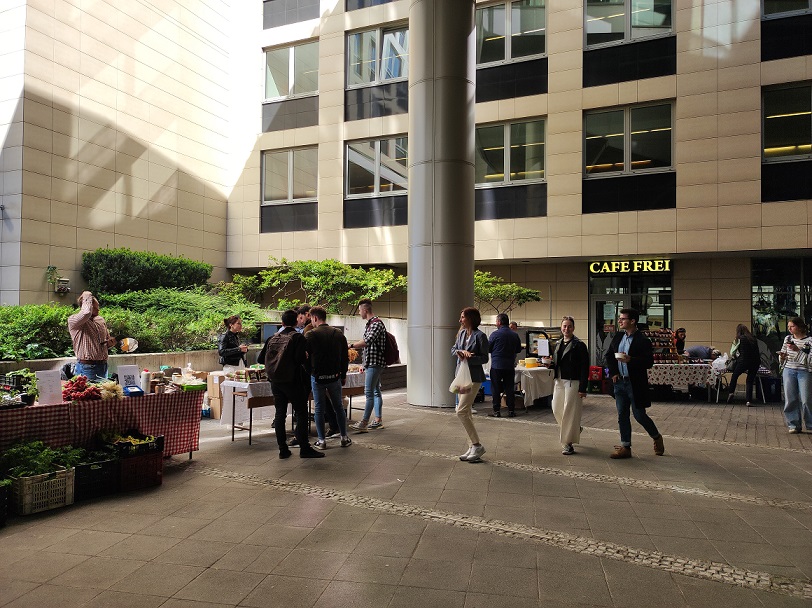Projects
The ESG story and what lies behind it
Is ESG a competitive advantage? What is the role of universities in training ESG professionals? This will also be discussed at the conference.
Corvinus Farmers’ Market
Sustainability Theme of the Month
Corvinus Accessibility Project
Project leader: Jácint Farkas
The Senate of the Corvinus University of Budapest has, as of 2021 approved the Accessibility and disability policy of our university.
The document contains the key points of the framework of accessibility and the processes related to it, the implementation of which should contribute towards the fulfillment of the “inclusive Corvinus” modelWe propose to the Steering Committee of the ERS Hub that both in the cases of accessibility and in the classic sense of the accessibility of the built environment, they should, by essentially combining them, embrace the development of an accessibility project, and then support its implementation at the university.
The accessibility development of the physical spaces of the Corvinus University of Budapest has been in progress for many years, however, we still do not know exactly where we stand in terms of the implementation. Therefore, we recommend that the buildings of the Corvinus University, including the Ménesi út campus, which is currently in the construction phase, be assessed and evaluated as part of an accessibility assessment.
Knowing the results of the survey, we should reach the starting point for accessibility development, and in light of the available data, the accessibility goals and opportunities for our built environment can be determined.
However, steps towards accessibility represent a more complex set of tasks beyond these, since they can be realized as a result of thinking and actions that shape individual and community consciousness.
As an initial step towards this, we recommend the introduction of classes in the various forms of education, where students can, in a manner adapted to their own fields of expertise, gain understanding about the topics of accessibility and its methods, as well as the possibilities inherent in them.
Since we are conceiving an organically developing, open project, we hope that the above initial steps will inspire citizens of the university to also jointly expand the implementation of accessibility measures at our university with additional dimensions.
Corvinus Ethics & Spirituality Program
Project leaders: László Zsolnai and András Ócsai
Project owner: Business Ethics Center
The aim of the project is to promote and strengthen the ideas and practices related to ethics and good life among students, faculty, leaders and other employees of the university. These ideas and practices are transcending the materialist and individualist value orientation and represent non-materialist and non-individualist conceptions contributing to the multidimensional (body-mind-spirit) realization of human existence.
The project is connected with The Awakened Campus Initiative developed by Professor Lisa Miller, Director of Columbia University Spirituality Mind Body Institute. (https://spiritualitymindbody.tc.columbia.edu/our-work/mental-health–wellness/awakened-campus/)
Together with international partners non-conventional, extra-curricular programs will be developed in the 2022-2023 Academic Year.
Corvinus ERS HUB sub-page project
Project leader: Katalin Ásványi
Colleagues involved in the project: Ákos Nagy, Adrienn Éda Pósvai, Csilla Csáki
The ERS Hub (Ethics, Responsibility and Sustainability) of Corvinus University was established to coordinate projects and initiatives in the three thematic areas at university level, and to provide an open platform for their wide dissemination, as well as for the involvement of volunteers and supporters.
In order to make the projects coordinated by the ERS Hub known and accessible to the citizens and stakeholders of the University, it is necessary to create a dedicated sub-page.
The structure of the sub-page of the website will be based on international benchmarking research.
The next stage of the project will be the development of the University’s sustainability sub-page, for which international and national benchmarking research will also be carried out to identify the necessary menu items and topics.
Global Climate Change Week project
Project leader: Mária Csutora
Colleagues involved in the project: Alexandra Köves and Gabriella Kiss
The Global Climate Change Week encourages cooperation and exchange of experiences between universities in the field of climate change-related action. The GCCW, held annually in October, provides a platform for university actions and events, an opportunity for university citizens to participate in events organised by others, support each other, and exchange knowledge. GCCW aims to raise awareness, encourage behavioral change and promote political transformation on climate policy.
Planned forms of participation:
- Announcement of own program (Brave new past – Gabriella Kiss – Alexandra Köves)
- Involving our students in the programs of other universities (Mária Csutora)
- Blog writing (Mária Csutora)
- Communication of the events of the Global Climate Change Week (Mária Csutora and communication staff)
https://www.globalclimatechangeweek.net
UI Green Metrics World University Ranking project
Project leader: Ákos Domahidi and Katalin Ásványi
Colleagues involved in the project: Dániel Baranyai
The UI Green Metrics World University Ranking is an initiative of Universitas Indonesia, launched in 2010. The results are based on a numerical score that allows ranking, so that a quick comparison can be made between universities based on aspects of their commitment to addressing sustainability issues.
It involves 956 universities from 80 countries with 2 553 576 staff.
https://greenmetric.ui.ac.id/about/welcome
This project will collect data for the University in the 5 selected areas [Setting and Infrastructure (SI), Energy and Climate Change (EC), Waste (WS), Water (WR), Transportation (TR), and Education (ED)] until 31 October 2022.
All departments are assisted in the data collection.
Corvinus Green project
Project leader: Ákos Domahidi
https://www.uni-corvinus.hu/post/landing-page/corvinus-green/?lang=en
REform European University projekt
Project leader: Zoltán Szántó and László Zsolnai
Colleagues involved in the project: Katalin Ásványi and Péter Fehér
Responsibility and Ethics in Innovation: a tranformation model = the REform European University Alliance (under progress)
ERASMUS+ application (2023 spring)
We want to bring together a number of European higher education institutions, located in various parts of Europe (Passau, Bucharest, Lyon, Budapest etc.), having different strengths, but a common vision of innovation, ethics and responsibility being at the heart of their institutions and a common wish to provide – through our European Universities’ Network – our students, our researchers, our teaching, administrative and business communities with a transformative European experience.
Through our alliance, we want to make our students, our researchers and our own institutions prepared for tomorrow challenges and able to innovate in a meaningful way. This means, making them fit for taking responsibilities and ready to initiate or follow ethical safeguards. This also means doing this through a dialogue with societal players.
ERS Agora
Project leader: Ásványi Katalin
Colleagues involved in the project: members of the Steering Committee
Once every semester, a half-day forum and brainstorming session, convened and sponsored by Steering Committee, to which all university citizens are invited and have the opportunity to contribute. The Agora is an opportunity to hear about past and ongoing actions and projects, and to present new initiatives.
The first ERS Agora will take place during the Research Week, where, in addition to internal colleagues, colleagues from the 13 universities participating in the newly established Hungarian Universities Sustainability Platform will be invited.

